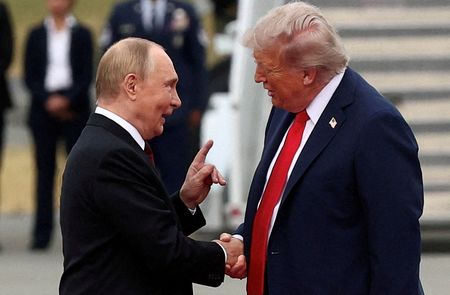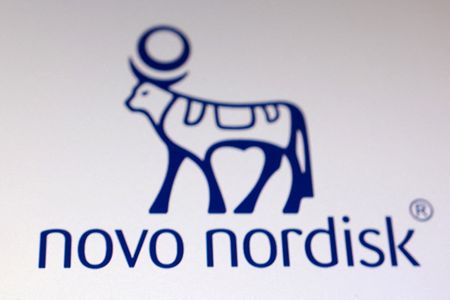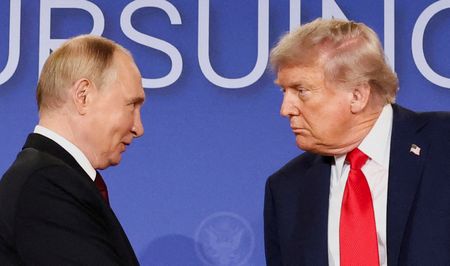By Timothy Gardner
WASHINGTON (Reuters) -U.S. President Donald Trump could quickly lift some sanctions on Russia as a reward to Moscow if peace talks with Ukraine go well, but only Europe can take the bigger steps needed to significantly ease Russia’s cash crunch.
Trump in recent days has renewed a threat to impose more sanctions and tariffs on Russia and buyers of its oil if there is no progress toward a peaceful settlement in the 3-1/2-year-long war in Ukraine. But if talks go well, he could begin to lift some of the punitive measures.
Among Trump’s options are releasing seized Russian assets, reopening U.S. lending to Russian banks and corporations, and allowing U.S. oil services companies to return to Russia’s far-flung oil and gas fields.
Without Europe’s cooperation, however, those measures would have limited effect and the most damaging sanctions – including massive restrictions on Russia’s global oil trade, the lifeblood of its economy – would stay in place.
Oil and gas revenue accounts for about a quarter of Russia’s total federal budget proceeds. Revenues from the sector have fallen sharply, a painful outcome for Russia amid higher spending since launching its military campaign in Ukraine.
“The U.S. unilaterally has far less to offer than the Europeans who have little reason to give Russia a break until they get a satisfactory resolution on Ukraine,” said Craig Kennedy, an associate at Harvard University’s Davis Center for Russian and Eurasian Studies.
The European Union has stressed it intends to maintain pressure on Russia until Moscow ends the war.
The biggest step Trump could take would be to ease Treasury Department sanctions restricting U.S. oilfield service companies from working in Russia, potentially enabling Russia to boost oil and gas production from some of its hardest-to-drill places, including in the Arctic.
U.S. and Russian officials have discussed the possibility of Exxon Mobil re-entering Russia’s Sakhalin-1 oil and gas project, Reuters previously reported, citing sources. Sakhalin-1 has to date not been directly designated under extensive U.S. sanctions on Russian energy.
The officials also discussed the possibility of Russia purchasing U.S. equipment for its LNG projects, such as Arctic LNG 2, which is under sanctions, the sources said.
Probably the quickest way to ease Russia’s cash crunch, however, would be for Europe to lift a ban on imports of Russian seaborne oil into the region. Europe was the destination for nearly half of Russia’s crude and petroleum product exports before the invasion of Ukraine, according to the International Energy Agency.
Reopening that market would allow Russia to reduce the billions of dollars in shipping costs it pays to send crude oil by tanker to China and India – now Russia’s main buyers.
But that’s out of Washington’s hands.
Europe would need to cooperate in any decision to lift a price cap imposed on Russian oil trades, though the U.S. could theoretically undermine it by stopping its own enforcement activities.
The cap, which the EU has agreed to tighten in September to $47.60 a barrel from $60 a barrel, is intended to limit Moscow’s revenues when oil markets are hot, without hindering global flows.
FROZEN ASSETS
The U.S. and Europe have the option of releasing Russian central bank assets held since the invasion, but here again, Europe has much more pull.
The EU has about $230 billion of the assets, while the U.S. has identified about $5 billion of the Russian assets in its banking system, according to Axios.
Returning those assets is one of the few moves Trump could take without Congress. It could be done in secret through licenses from the Treasury Department, details of which are not released to the public.
“Releasing those funds would not go unnoticed by (Russian President Vladimir) Putin while likely avoiding any domestic attention,” said Jeremy Paner, a partner at law firm Hughes Hubbard & Reed and former Treasury Department sanctions investigator.
Europe also holds the cards when it comes to re-admitting Russian banks to the SWIFT global payments network, which is based in Brussels and under EU law.
The West could open the taps on capital markets lending to Russian banks and corporations. But big U.S. banks would be unlikely to lend large sums without European counterparts doing the same, according to Kennedy.
“Historically, European banks led the way in Russia, they have the expertise and the risk appetite,” Kennedy said.
(Reporting by Timothy Gardner; additional reporting by Daphne Psaledakis; editing by Richard Valdmanis and Nia Williams)











